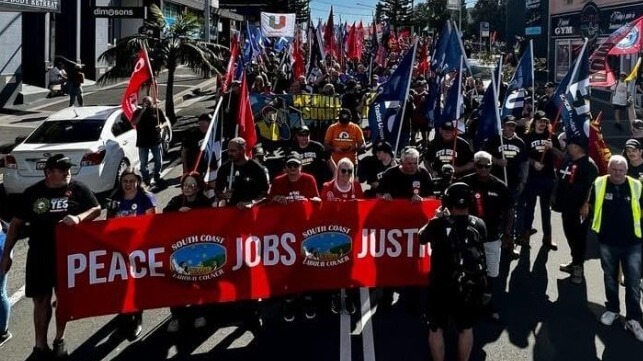Unions Protest AUKUS Nuclear Sub Base Plans at Port Kembla

Last weekend, thousands of activists rallied in Port Kembla, Australia to protest the establishment of a nuclear submarine base for the joint U.S.-UK-Australian sub project, better known as the AUKUS agreement.
The $250 billion program will see Australia acquire nuclear subs and related technology from the United States and Britain over the span of the next three decades. Port Kembla has been identified as a top candidate for basing these new subs on Australia's eastern seaboard. In 2027, long before the Royal Australian Navy's first nuclear subs are delivered, the UK Royal Navy and the U.S. Navy will begin rotating their own subs through Australian naval bases as part of a newly-created "Submarine Rotational Force West." The partners have been at pains to emphasize that the persistent presence of foreign subs at Australian naval bases is not a foreign basing agreement, a taboo concept in Australian defense policy.
Local opposition is centered on fears that a base for nuclear-powered submarines could deter investment in new renewable-energy industries in Port Kembla. The area is traditionally focused on coal mining and steelmaking, two particularly carbon-intensive activities. But green entrepreneurs and regulators have hopes that it could be turned into a hub for renewable industry - for example, hydrogen-fueled blast furnace operation - if enough investors can be attracted. Arthur Rorris, head of the South Coast Labour Council and a member of the governing Labor Party, told The Guardian that nuclear-powered subs would get in the way.
"That is why we are asking the federal government: rule it out, take it off the table and say that it will never be a nuclear base. Until that happens, economically and industrially, we have a major and unacceptable problem," he said. "We’re at the point where we’re able to get the fruits of all that work, now they want to turn this place into ground zero."
The pushback from within its own rank and file has led the Labor government of Anthony Albanese to pause the selection of a final site for an east coast base for now, though the plan to build one at some location along the coast remains intact.
Port Kembla's quaysides have seen anti-war protests before, and this history is well-remembered by local unions. In the late 1930s, longshoremen at Port Kembla refused to load iron cargoes intended for Imperial Japan's steel mills, which were feeding the ongoing invasion of China and powering Japan's military buildup. The dockers were years ahead of the Australian government, which reached a similar decision and declared war on Japan in 1941.
“They have picked the wrong town to try to base their nuclear subs. Port Kembla is a union town with a long history of anti-war struggle," said New South Wales Green Party Senator David Shoebridge, speaking to a leftist Australian news outlet. "They are trying to kill off an amazing future for Port Kembla as a green and renewables' hub."
No comments:
Post a Comment